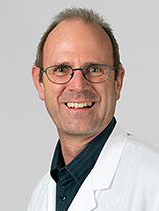Surgical Intensive Care Medicine
Head
|
|
|
Prof. Reto Schüpbach, MD
|
KD Peter Steiger, MD |
Organization
Intensive medicine (IS) provides a platform allowing almost all specialties in medicine to offer advanced invasive or surgical procedures and therapies and promotes therapies of syndromes, typically seen in critical care (ICU) patients.
The institute for intensive care medicine is undergoing a vast change process by consolidating different intensive care divisions.
In a first step, the science team of Prof. Dr. Med Marco Maggiorini has joined the surgical intensive care science team.
Intensive care medicine research separates into clinical and basic research, where the following core areas are covered:
- Clinical studies with brain injury and patients with neurologicalissues
- Basic research of Sepsis (partially via anaesthesia or heart surgery research)
- Basic research of clotting with inflammations
- Clinical studies in hemodynamic and device applications
The institute for intensive care medicine pursues a quick consolidation of its structure by building up a joint basic and clinical research team, collectively training new staff and leading a conjoint concept for data collection across all intensive care stations – together with all intensive care stations in Swiss university hospitals.
Presently active research groups are to be linked in form and content in order to facilitate them as the following research focus points:
- Core area neurotraumatology and neuro intensive care medicine
- Core area of systematic inflammation (Sepsis, infection, vascular intra-vascular barrier dysfunction)
- Core area of intensive care improvement
Thanks to the Swiss Personalized Sepsis Study (SPHN call), where a first co-authored research is conducted (first author Prof. Adrian Egli, Universität Basel) - simultaneously combined with a USZ- internal installation of a fully electronic patient documentation system – the focus of creating a superordinate research platform increased fundamentally.
Simultaneously – and according to the UZH mission statement of promotion of innovation – a second research and development collaboration with an industrial partner was established. The aim of this partnership is (1) an improvement in ventilation strategies with critically ill patients, (2) an improvement in machine / user interaction and (3) a development of new tools and features of ventilation machines.
Collaborations
- ECKS: Indikatoren / Kontraindikatoren – Berliner Charité & Universitätsmedizin Göttingen
- Visus: Visual behaviour of intensivists in usual daily situations – Kinderspital Zürich - Eleonorenstiftung
- ECMO: factorial survery – Berliner Charité & Universitätsmedizin Göttingen

